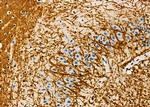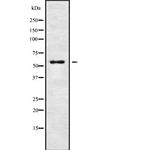Search Thermo Fisher Scientific
FIGURE: 1 / 2
KCNG4 Antibody (PA5-104026) in IHC (P)


Product Details
PA5-104026
Species Reactivity
Host/Isotype
Class
Type
Immunogen
Conjugate
Form
Concentration
Purification
Storage buffer
Contains
Storage conditions
Shipping conditions
RRID
Product Specific Information
Antibody detects endogenous levels of total KCNG4.
Target Information
Voltage-gated potassium (Kv) channels represent the most complex class of voltage-gated ion channels from both functional and structural standpoints. Their diverse functions include regulating neurotransmitter release, heart rate, insulin secretion, neuronal excitability, epithelial electrolyte transport, smooth muscle contraction, and cell volume. This gene encodes a member of the potassium channel, voltage-gated, subfamily G. This member functions as a modulatory subunit. The gene has strong expression in brain. Multiple alternatively spliced variants have been found in normal and cancerous tissues.
For Research Use Only. Not for use in diagnostic procedures. Not for resale without express authorization.
References (0)
Bioinformatics
Protein Aliases: potassium channel, voltage gated modifier subfamily G, member 4; Potassium voltage-gated channel subfamily G member 4; potassium voltage-gated channel, subfamily G, member 4; voltage-gated potassium channel Kv6.3; Voltage-gated potassium channel regulatory subunit KCNG4; Voltage-gated potassium channel subunit Kv6.3; Voltage-gated potassium channel subunit Kv6.4
Gene Aliases: 4921535I01Rik; AW049024; KCNG3; KCNG4; KV6.3; KV6.4
UniProt ID: (Human) Q8TDN1, (Mouse) Q80XM3
Entrez Gene ID: (Human) 93107, (Rat) 307900, (Mouse) 66733

Performance Guarantee
If an Invitrogen™ antibody doesn't perform as described on our website or datasheet,we'll replace the product at no cost to you, or provide you with a credit for a future purchase.*
Learn more
We're here to help
Get expert recommendations for common problems or connect directly with an on staff expert for technical assistance related to applications, equipment and general product use.
Contact tech support
